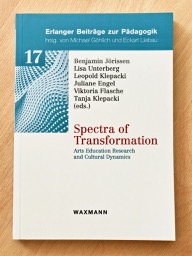 “Spectra of Transformation: Arts Education Research and Cultural Dynamics”
“Spectra of Transformation: Arts Education Research and Cultural Dynamics”
… is the first english publication (of several others currently in preparation) of the team of my chair. The volume represents the outcome of the same-named winter school we conducted in 2017, providing theoretical perspectives of transformational processes in a first section and selected presentaitons of ongoing PhD-research projects in Europe related to transformational issues in arts education.
Like every pedagogical field, the fields of aesthetic, arts and cultural education have been confronted with various transformational dynamics in recent decades. Transformation processes such as globalization, digitization or transculturalization not only characterize a change in social and cultural framework conditions, but also lead to changes in selfunderstanding, working methods, contents, and objectives in the research of these educational fields.
The anthology „Spectra of Transformation“ gathers key insights and reflections upon transformational dynamics which may deeply affect the future(s) of aesthetic, arts and cultural education. It provides a selection of recent research projects from eight European countries on various transformational phenomena in the fields of arts education, which were presented and discussed at a winter school held at the Friedrich-Alexander-Universität Erlangen-Nürnberg in 2017.
With contributions by Hannelore Bublitz, Vanessa Friedberger, Marc Hill, Fabian Hofmann, Teunis IJdens, Tuula Jääskeläinen, Benjamin Jörissen, Leopold Klepacki, Tanja Klepacki, Egge Kulbok-Lattik, Sarah Kuschel, Zofia Małkowicz, Catarina Silva Martins, Luise Reitstätter, Esther Ropón, Martha Karoline Schröder, Lisa Unterberg, Anna-Carolin Weber
Preface
It is evident that we are living in highly transformative times. Transformations on major cultural and societal scales, such as economical, digital- and media-related, environmental, migrational changes, are vastly changing people’s liveworlds and everyday experiences on a global scale. These transformations affect edcuational systems, policies and the conditions of pedagogical thinking and working, as they change aesthetic practices, from (mostly informal) everyday practices to (more institutionalized) artistic ways, means, and conditions of work.
Those both fields of change – educational and aesthetic/artistic – evidently interfere in the realms of aesthetic, arts and culutral education. With regards to arts education, the last decade has been a time where the challenges of the Seoul-Agenda goals met the challenges of the disruptive changes mentioned above – which in fact only underlines the importance of a global, intercultural discourse and exchange in arts education research as well as practice.
While we tend to look at major transformations by defining them as rather isolated issues – such as „the phenomenon of digitalization“ –, it nowadays appears clearly that those processes are deeply intertwined, and have to be understood in adn through their relatedness. For example, digitalization may hardly be understood without regard to economical globalization, political changes may hardly be understood without regard to digitalization, migration, of course, is tied to political and economical conditions, but evidently ever more related to digital (mobile) media and their capability of castly spreading information within seconds, from virtually every place on earth.
In this spirit, the core idea of the international Winterschool „Spectra of Transformation“, which took place in February 2017 at the University of Erlangen-Nuremberg in Germany, was to look at the effects and impacts of those multiple global transformational dynamics not as isolated phenomena, but to explore those in interrelated perspectives. In many keynotes and workshops, transformations due to migration/postmigration, digitalization, policy/governance, visual culture, transformative images and imagineries of arts education, and the research methodologies required to make the traces of transformational dynamics in (educational and everyday) practice visible have been deeply explored and discussed over a term of three days, especially regarding the research (PhD) projects of our participants.
Encompassing practical, institutional, empirical and theoretical perspectives, this conference mainly driven by the many very elaborated and also critical inputs of the congregated young researchers, provided broad and rich insights to us, and hopefully our participants. The volume presented here shows some of the results and developments as an aftermath of this event. We hope it will contribute as an inspiration to the international arts education discourses. A very special thanks goes to our the contributing researchers (which mostly contributed to this volume), to our cooperation partners, the Erlangen UNESCO-Chair for Arts and Culture in Education, the European Network of Observatories in Arts Education (related to UNESCO), to our critical friends from the german Netzwerk Forschung Kulturelle Bildung – namely Professor Dr. Fabian Hofmann and Sarah Kuschel – and, last not least, to our teammates who kindly took the efforts to prepare this volume, PD Dr. Leopold Klepacki and Dr. Lisa Unterberg.
The winter school “Spectra of Transformation”, as well as this publication, has been made possible by a grant of the Volkswagen Foundation
